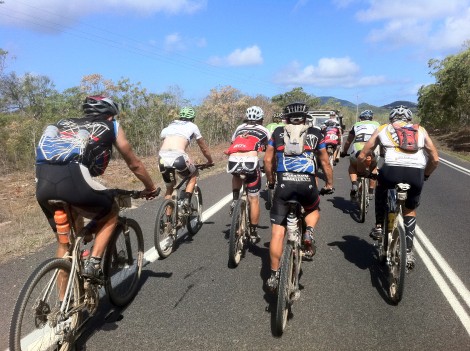The rift between motor vehicle drivers and cyclists sharing the road is a self perpetuating continuum of angst for both parties and unfortunately it is the cyclist, the more vulnerable party, that often pays the ultimate price. I cycle and I drive, I have had a near death experience thanks to the ignorance of a motor vehicle driver and I have had an innocent, but unlicensed, motor cycle driver slam into my windscreen. When I ride I do more than just shake my head at the apparent ignorance of motor vehicle drivers and when I drive I want to scream at cyclists for riding like they own the road, not just the bike lane but the WHOLE road.
Neither party is innocent and there comes a time when we have to step up and set an example that will hopefully create a wave of change and allow a harmonious SHARING of the road. Cyclists are legitimate road users, motor vehicle drivers need to know this and in return cyclists need to respect the rules that govern their behaviour on the road. In 2005, Amy Gillett, 29, was killed when a motorist collided with the Australian road cycling team during a training ride in Germany on July 18th. In 2006 The Amy Gillett Foundation started advocating on behalf of cyclists for road safety and motor vehicle driver education. Finally, June 2013, the Legislative Assembly agreed to a motion that the Transport, Housing and Local Government Committee inquire into and report on the following particular issues to improve the interaction of cyclists with other road users: Report No. 39.
The guiding principles applied to the committee in the formulation of the report were:
- “Reducing cycling injury and fatality rates on Queensland roads through the physical separation of cyclists from motorists wherever possible and making specific provision for cyclists where physical separation is not possible.
- Increasing cycling participation rates and ‘normalising’ cycling as a mode of transport.
- Increasing the acceptance of cyclists as legitimate road users and impressing on all road users their obligations to ‘share the road’.
- ‘Humanising’ the image of cyclists in the eyes of other road users, thereby overcoming the often harmful consequences of cyclists being considered ‘outliers’.
- Providing increased protection for all vulnerable road users.”
The committee made it their duty to thoroughly investigate the current day relevance of laws pertaining to cycling and the penalties in place for breaking these laws. The report was finally tabled on the 29th November 2013, the details of the committees findings and their 68 recommendations can be found online here. I understand 65 of these recommendations are to be adopted and implemented over the ensuing years. “The Committee has recognised the importance of the role of education and awareness between cyclists, drivers and pedestrians, in concert with the implementation of improved infrastructure and legislative reform”. Amy Gillett Foundation (AGF)
The most significant is the update to the minimum overtaking distance (MOD) an initiative I believe was started several years ago by the Amy Gillett Foundation (AGF) with their “a metre matters” campaign:
“The Committee recommends that the Minister for Transport and Main Roads amend Queensland road rule section 144 to introduce a minimum overtaking distance by inserting a new provision specifying that a sufficient distance for overtaking a bicycle means:
- A lateral distance of not less than 1 metre if the applicable speed limit does not exceed 60 km/h and
- A lateral distance of not less than 1.5 metres if the applicable speed limit exceeds 60 km/h.”
Adam Cobain – rode for the AGF team at the Croc Trophy
The most controversial recommendation is that of the mandatory helmet law (MHL) as despite committee findings the Minister for Transport and Main Roads rejected this recommendation as he believed otherwise on a personal level. The MHL was implemented in Australia in the 1990s as an initiative to help reduce the severity of head trauma in cycling accidents. The majority of overseas jurisdictions (191 countries) do not mandate the use of helmets for non competitive cyclists. Australia is destined to keep their MHL because the Minister says so…against contrary findings by the committee.
“The Committee recommends that the Minister for Transport and Main Roads:
- Introduce a 24 month trial which exempts cyclists aged 16 years and over from the mandatory helmet road rule when riding in parks, on footpaths and shared/cycle paths and on roads with a speed limit of 60 km/hr or less and
- Develop an evaluation strategy for the trial which includes baseline measurements and data collection (for example through the CityCycle Scheme) so that an assessment can be made which measures the effect and proves any benefits.”
Some other interesting recommendations include the allowance of the ‘rolling stop’ and ‘left turn on red permitted after stopping’ rules. There are updates recommendations to rules pertaining to cyclists on roundabouts allowing cyclists to use the ‘car lane’ and on bike paths where bells are no longer required so long as you have a voice. The penalties for misconduct have been reviewed and more stern deterrents recommended for both cyclists and motor vehicle drivers. There is not a facet of cycling the committee did not address but with this new empowerment comes a heightened responsibility to all cyclists. We are the more vulnerable being on the road and in order to get the respect implied by the findings of this committee we too have to respect the motor vehicles.
The changes are coming but they will not happen overnight and until they do we (as cyclists) must all behave in a positive and educational manner.

